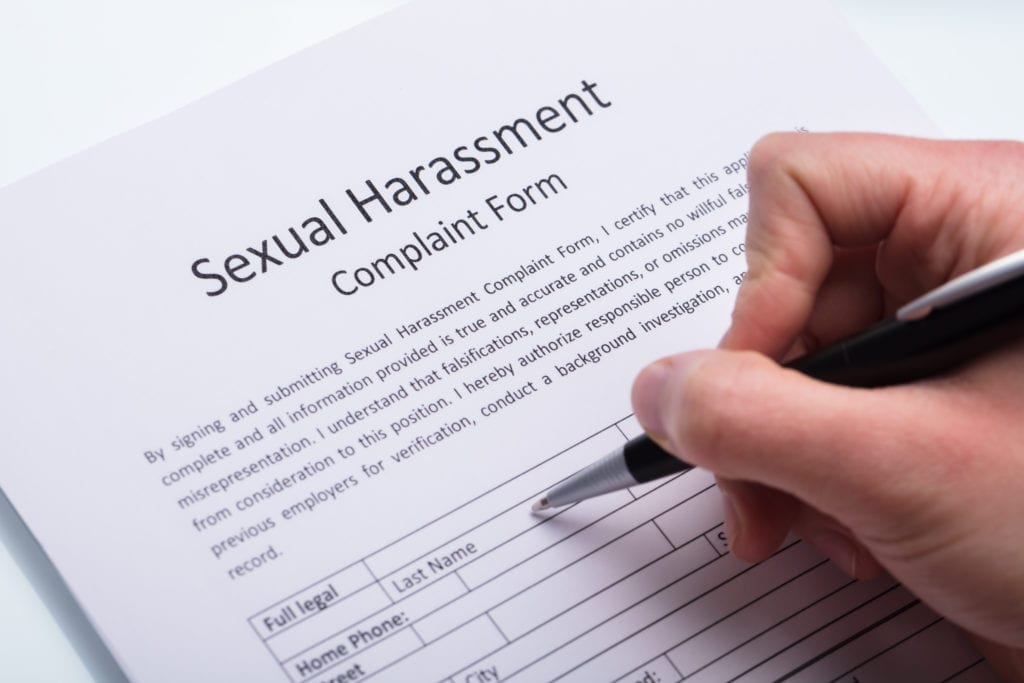BRIAN J GRABER LLC is a Michigan sexual harassment lawyer representing Michigan employees sexually harassed in the workplace in violation of Michigan and federal sexual harassment laws. Michigan’s Elliott-Larsen Civil Rights Act, (ELCRA), targets sexual harassment because it is both “pervasive” and “destructive, entailing unacceptable personal organizational, and societal costs.” See Radtke v. Everett, 442 Mich. 368, 380 (Mich. 1993). The Legislative Analysis stated as follows:
Individuals who are sexually harassed suffer psychologically, physically, and economically. Organizations which allow such activities suffer reduced worker safety and efficiency, costly job turnover, and increased medical, psychological and sick leave costs. Society pays a price for sexual harassment, since this behavior results in the creation of a female job ghetto in which a large segment of the work force remains transient or abused in the job market.
See Radtke v. Everett, 442 Mich. at 380 (quoting House Legislative Second Analysis, HB 4407, Aug. 15, 1980).
Michigan sexual harassment law recognizes two types of sexual harassment. The first type of sexual harassment is known as “quid pro quo” meaning, “this for that.” The second type of sexual harassment is known as a “sexually hostile work environment.” The Elliot-Larsen Civil Rights Act defines sexual harassment in Michigan as follows:
Discrimination because of sex includes sexual harassment. Sexual harassment means unwelcome sexual advances, requests for sexual favors, and other verbal or physical conduct or communication of a sexual nature under the following conditions:
(i) Submission to the conduct or communication is made a term or condition either explicitly or implicitly to obtain employment, . . . .
(ii) Submission to or rejection of the conduct or communication by an individual is used as a factor in decisions affecting the individual’s employment . . . .
(iii) The conduct or communication has the purpose or effect of substantially interfering with an individual’s employment, . . . creating an intimidating, hostile, or offensive employment . . . .
MCL 37.2103(i)
Quid Pro Quo Sexual Harassment Results in Strict Liability for an Employer
Under Michigan sexual harassment law, quid pro quo sexual harassment is where submission to or rejection of sexual conduct or communication is used as a factor in employment decisions relating to the sexual harassment victim’s job benefits like hiring, firing, failing to promote, demotions, discipline, pay cuts, or a decision resulting in a significant change in benefits. Quid pro quo sexual harassment requires a management employee to exercise his or her authority to take tangible adverse employment action against a subordinate employee where submission to or rejection of sexual conduct or communication is used as a factor in taking the tangible adverse employment action. Mere threats from a management-level employee to take tangible adverse employment action against the sexual harassment victim is not enough to create quid pro quo liability for an employer. The management level employee must use his or her authority to take tangible adverse employment action against the sexual harassment victim.

Quid Pro Quo Burden of Proof
An employee claiming quid pro quo sexual harassment under the ELCRA must prove the following elements:
- That the employer or its agent subjected the employee to unwelcome sexual advances, requests for sexual favors, other verbal or physical conduct or communications of a sexual nature; and
- That his or her employer or its agent used the employee’s submission to or rejection of such conduct or communication as a factor in a decision affecting the employee’s employment; and
- That he or she suffered damages.
A decision affecting the employee’s employment must be tangible employment action. To be tangible employment action, the action must result in a change of employment status such as hiring, firing, or failing to promote. Additionally, the employee must demonstrate that the tangible employment action which he or she suffered was caused by his or her rejection of, or submission to, the harassment.
Employer Vicarious Liability for Quid Pro Quo Sexual Harassment
Vicarious liability exists in the case of quid pro quo harassment under Michigan’s ELCRA because the quid pro quo harasser uses the power of the employer to alter the terms and conditions of the sexual harassment victim’s employment. See Chambers v. Trettco, Inc., 463 Mich. 297, 311 (Mich. 2000). If you believe you were terminated for refusing a supervisor’s sexual advances, contact Brian J Graber LLC, a Michigan sexual harassment lawyer at (269) 236-6054 for a free confidential consultation or send us an email requesting a free confidential consultation.
Hostile Work Environment Sexual Harassment
Under Michigan sexual harassment law, a sexually hostile work environment is actionable when the work environment is so tainted that, in the totality of the circumstances, a reasonable person in the employee’s position would have perceived the conduct at issue as substantially interfering with employment or having the purpose or effect of creating an intimidating, hostile, or offensive work environment. See Radtke v. Everett, 442 Mich. 368, 371 (Mich. 1993).
The essence of a hostile work environment action is that one or more supervisors or co-workers create an atmosphere so infused with hostility toward members of one sex they alter the conditions of employment for them. Radtke v. Everett, 442 Mich. 368, 385 (Mich. 1993). Therefore, a loss of a tangible job benefit is not necessary since the harassment itself affects the terms or conditions of employment. Radtke, 442 Mich. at 385.

Hostile Work Environment Burden of Proof
An employee must prove the following elements by a preponderance of the evidence to establish a claim of hostile work environment sexual harassment:
(1) The employee belonged to a protected group;
(2) The employee was subjected to communication or conduct on the basis of sex;
(3) The employee was subjected to unwelcome sexual conduct or communication;
(4) The unwelcome sexual conduct or communication was intended to or in fact did substantially interfere with the employee’s employment or created an intimidating, hostile, or offensive work environment; and
(5) Respondent superior.
Chambers v. Trettco, Inc., 463 Mich. 297, 311 (Mich. 2000).

Employer’s Vicarious Liability for Sexual Harassment
When a hostile work environment has been created because of unwelcome sexual communication or conduct that substantially interferes with an individual’s employment, the violation can only be attributable to the employer if the employer failed to take prompt and adequate remedial action after being reasonably put on notice of the harassment. See Chambers v. Trettco, Inc., 463 Mich. 297, 313 (Mich. 2000). The Model Jury Instructions require an employee to prove the following elements to establish employer liability:
- The employer had adequate notice that the employee was subjected to sexual harassment, and
- The employer failed to take prompt and adequate remedial action which reasonably served to prevent future harassment of the employee, and
- Further sexual harassment of the employee occurred as a result of the employer’s failure to take adequate remedial action.
If you believe that you were subjected to a sexually hostile work environment, contact BRIAN J GRABER, LLC, a Michigan sexual harassment lawyer, for a free confidential consultation by phone at (269) 230-6054 or by email.
The Federal Arbitration Act was amended effective March 3, 2022, to ban mandatory arbitration agreements covering workplace sexual harassment and sexual assault claims. Click here to learn more about your rights to be free from mandatory arbitration agreements under Michigan and Federal law.

Most employers have written anti-sexual harassment policies describing how to report supervisors or co-workers subjecting you to unwelcome sexual conduct or communication in the workplace and identifying who to report unwelcome sexual conduct or communications. An employee who follows the employer’s sexual harassment reporting policy by providing adequate notice supervisors or co-workers are subjecting them to unwelcome sexual conduct or communication puts an employer on adequate notice and the employer will have vicarious liability if it fails to take prompt and adequate remedial action to prevent further sexual harassment and the sexual harassment occurs again.
An employer that retaliates against an employee for reporting sexual harassment may have liability under Michigan’s ELCRA for retaliation. Learn more about your right to be free from retaliation in violation of Michigan’s ELCA here. If you believe that you suffered retaliation for reporting sexual harassment contact Brian J Graber LLC, Michigan sexual harassment lawyer for a free confidential consultation at (269) 230-6054 or by email.
If you believe that you were sexually harassed in the workplace contact Brian J Graber LLC, a Michigan sexual harassment lawyer at (269) 230-6054 for a free confidential consultation as soon as possible. Michigan employees also have rights under Title VII to be free from workplace sexual harassment. Learn more about your rights under federal law to be free from workplace sexual harassment here.
